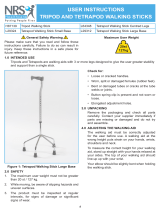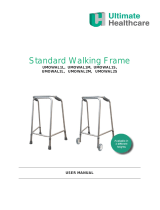Page is loading ...

Walking Frame
User Manual
Drive DeVilbiss Healthcare Ltd,
Holmfield, Halifax, West Yorkshire, HX2 9TN, UK
Tel: 0845 0600 333 | Fax: 0845 0600 334
Email: info@drivedevilbiss.co.uk
www.drivedevilbiss.co.uk
warranty details
Your Drive DeVilbiss branded product is warranted to be free of
defects in materials and workmanship for one year from date of
purchase.
This device was built to exacting standards and carefully
inspected prior to shipment. This warranty is an expression of
our confidence in the materials and workmanship of our
products and our assurance to the customer.
In the event of a defect covered by this warranty, we will at our
option supply parts or replace the device.
This warranty does not cover device failure due to owner
misuse or negligence, or normal wear and tear. The warranty
does not extend to non-durable components, such as rubber
accessories, castors, and grips, which are subject to normal
wear and need periodic replacement.
If you have any queries or require full warranty conditions,
please contact your Drive DeVilbiss stockist.
If use of the walking frame results in a serious incident, contact
either Drive DeVilbiss Healthcare or your local Competent
Authority.
Issue: 2021-10.2
If maintained correctly, the walking frame has an expected life
of 5 years.
When the frame has come to the end of its useful life, follow the
local recycling and disposal policies.
care and maintenance
The walking frame should be regularly checked for signs of
damage or wear and tear. Check for:
ŸDamage to tubing, including any bends or cracks at the tube
joints.
ŸWorn or loose push buttons or elongated holes.
ŸLoose or worn handgrips or wheels.
ŸSmooth, worn or split tips.
ŸLoose or unscrewed fasteners.
Replacement tips are available from Drive DeVilbiss Healthcare
Ltd.
Cleaning:
The walking frame should be cleaned regularly with a damp
cloth and mild detergent.
Bleach, solvents, or abrasive detergents should not be used.
If it is necessary to decontaminate the walking frame, wipe
down with a 0.1% chlorine solution (1000ppm) in cold water.
Rinse down with cold, clean water using a clean cloth.
Ensure the frame is fully dry before putting back into use.
specification
Maximum user mass: 160kg (25 stone)
Weight of walking frame approximately 2.5kg (5.5Ib)
REF Description Size Width Depth Height
10281-30 Narrow Medium 51cm 45cm 78 - 85cm
10282-30 Narrow Large 53cm 52cm 86 - 93cm
10283-30 Domestic Small 61cm 50cm 67 - 74cm
10284-30 Domestic Medium 60cm 51cm 77 - 84cm
10285-30 Domestic Large 60cm 52cm 87 - 94cm
10281W-30 Narrow Medium 51cm 48cm 79 - 86cm
10282W-30 Narrow Large 53cm 55cm 87 - 94cm
10283W-30 Domestic Small 61cm 53cm 68 - 75cm
10284W-30 Domestic Medium 60cm 54cm 78 - 85cm
10285W-30 Domestic Large 60cm 55cm 88 - 95cm

introduction
To minimise the risk of injury from improper and unsafe
use of this walking frame, read the instructions and safety
precautions before using.
Intended purpose
A walking device manipulated by both arms to provide support
to a person whilst walking.
Environment of use
The walking frame is suitable for indoor use only.
Intended users
Any individual who has difficulty in walking and/or has reduced
mobility.
Contraindications:
User is unable to weight bare.
User is unable to adequately manoeuvre the walking frame.
Users with Hemiplegia.
Users with only one arm.
Users who weigh in excess of 160kg.
Other contraindications may be relevant which are specific to
the patient or care environment.
safety precautions
ŸHealthcare professionals must carry out a risk assessment
to ensure that the walking frame is suitable for the specific
user and that they are trained in how to use it safely.
ŸNot to be used by persons heavier than 160kg (25 stone)
ŸEnsure that all the legs are set to the same height and that
the frame is at the correct height for the user.
ŸEnsure that the push buttons have securely locked the legs
in position.
ŸEnsure the tips have sufficient grip and beware of slippery
surfaces such as wet floors.
ŸCheck the tips regularly - replace if worn and uneven.
ŸInspect the walking frame regularly for signs of damage or
wear (see care and maintenance section).
height adjustment
The height of the walking frame should be adjusted to suit each
user for safety and comfort.
To adjust the leg height:
1. Push in the buttons (as indicated in the
diagram)
2. Extend or retract the leg to raise or lower the
frame height accordingly.
3. When the required height is reached, release
the buttons and ensure the leg locks into position.
4. Repeat for the other legs, ensuring all legs are
securely locked in position and are all adjusted to
the same height.
Note: Some models come with front wheels. For these models
the rear legs should be set 1 hole higher than the front legs to
compensate for the extra height of the wheels, if a flatter
handgrip angle is required.
A Healthcare Professional must check that the walking frame is
set to the correct height for the user.
using the walking frame
Walking:
1. Place the walking frame one step ahead and place all four
legs on the floor.
2. Step forward with the worst affected leg first, then bring the
second leg forward, level or just past the first leg. Do not step
too far into the frame.
3. For wheeled walking frames, slightly lift the rear tips off the
floor and push the frame a short distance ahead. Place all four
legs on the floor, then step forward with the worst affected leg
leading.
Glide caps: The wheeled walking frames come with optional
glide caps to help users walk on surfaces such
as carpet. These should only be used on
suitable indoor surfaces.
To install the glide caps, push the cap onto the
bottom of the rear tips (as shown). Pull down on
the glide caps to remove.
Consult a Healthcare Professional
before using the glide caps.
using the frame with chairs
To sit down:
1. Turn around in front of the chair, so that you have your back
to the chair. Ensure that you can feel the chair behind you, on
the back of your legs.
2. Place one hand back onto the arm of the chair, then the
second hand. Bend slightly forwards and lower yourself gently
onto the seat.
To stand up from a chair:
1. Position the walking frame in front of the chair.
2. Stand up from the chair, placing your hands on the chair
arms, if necessary. When stood up, move your hands to the
walking frame handgrips, before beginning to walk.
Do not use the walking frame as a support, to pull
yourself up out of the chair.
ŸIf using with a chair, ensure that the chair has arms and a
high seat to help you stand up and sit down easily.
ŸEnsure there are no obstacles on the surface such as rugs
or loose flooring.
ŸAvoid uneven surfaces and sideways sloped surfaces. Take
care when descending ramps.
ŸTake care when storing or carrying the frame to avoid
damage. In the event of an incident the frame must be
inspected before use.
ŸTo avoid high surface temperatures, ensure the walking
frame is not left in direct sunlight.
/



